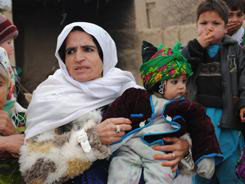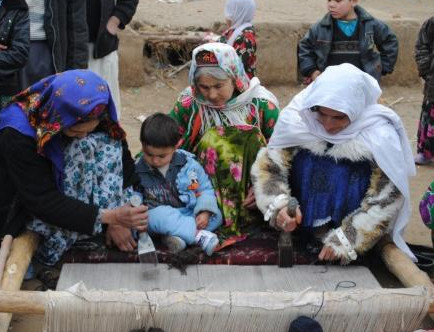By Bethany Matta

Zarghoona, 37, lost one of her children by overfeeding the child opium. (Photo: Bethany Matta/USA Today)
Zarghoona, 37, sits on the ground in a courtyard of an impoverished Turkmen village in the northwestern province of Kunduz. Her wrinkled face make her appear twice her age.
"I am from this village," she says. "I have five sons and three daughters; one of my daughters died, though."
Losing a child is not uncommon in a nation where one in 10 children die before the age of 5 due often to preventable illnesses such as respiratory infections. But here, children are dying from taking drugs given to them by their mothers.
"I fed my daughter a lot of drugs at one time. It killed her," says Zarghoona, who like many here in this region goes by one name. "We didn't have the money to take her to the hospital."
Using drugs such as opium is common practice here and in dozens of villages that make up the carpet-weaving center of the Qali a Zal district. Nearly all the women in this district are carpet weavers. The mundane nature of the work and long hours are made tolerable by drugs that make addicts of mothers and children.
Kunduz province, population 800,000, has more than 30,000 drug addicts, according to the Kunduz Drug Treatment Center. Nearly half of these come from Qali a Zal alone, and women and children make up 40%.
"Unlike other districts, the most anguishing point is that the women are addicted," said Abdul Basir Murshid, director of counternarcotics for the Afghan government in Kunduz.

Several people work on a rug loom in Afghanistan. The taking of drugs, such as opium, is common practice in dozens of villages that make up the carpet-weaving center of the Qali a Zal district. (Photo: Bethany Matta/USA Today)
The women work from early morning to late in the evening, and keeping the children quiet is necessary for the women to work undisturbed.
On this day women can be seen reaching inside their clothing and pulling out plastic packets containing raw opium. They unfold the plastic, roll the sticky substance inside into a ball, and place it in their mouths.
One mother pulls out her plastic packet, rolls a ball and feeds it to her child in her lap.
"When a baby is born, on the very first day they grease their navel with fluid of opium, so that the baby does not cry and sleeps well," says Dr. Rahmatuliah, who heads the local government council here.
"After a few months, they give it to them orally," he says. "I have told many of these people not to do this, but they say, 'We have raised all our babies like this.' "
Zarghoona says all of her children have been using opium since they were born. Others say the same and say they have been using for 20 or 30 years.
Drug abuse has received little notice, according to drug-control advocates here. The United Nations Office on Drugs and Crime reports that there were around 1 million drug users in Afghanistan in 2010, about 8% of the adult population or a rate twice the global average.
Opium is the most commonly used opiate, followed by heroin. Afghanistan has seen a 53% rise in the number of opium users, over 2005, the U.N. says. Afghanistan's poppy crops produce 90% of the world's opium.
For those who are hooked, there is little help. The tribal council here says there are no clinics for addicts.
There are 40 drug treatment centers in Afghanistan. The closest is in the provincial capital of Kunduz city, about 40 miles away. Not that many would make the trip, local officials say.
"They could not even lift a glass of water now without the drugs because they are so weak," Dr. Rahmatuliah says.



